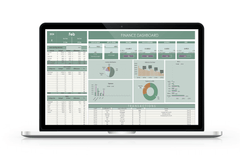In today’s fast-paced world, many people find themselves constantly working to make a living while sacrificing time for themselves, family, and personal interests. Achieving a healthy work-life balance isn’t just about managing time—it's about aligning your finances with the life you truly want to live. Financial independence can give you the freedom to make choices, pursue passions, and create meaningful experiences outside of work.
Why Work-Life Balance Matters
Work-life balance is essential for both your mental and physical health. Spending too much time focused on work can lead to burnout, stress, and dissatisfaction with life. When you create balance, you can enjoy personal time, build relationships, and focus on things that bring joy.
However, creating this balance doesn’t mean working less—it means managing your money wisely to give yourself more flexibility and options. Financial planning is key to creating that flexibility, allowing you to live a fulfilling life both now and in the future.
The Role of Financial Planning in Work-Life Balance
Financial planning plays a critical role in achieving work-life balance. It’s about more than just budgeting—it’s about setting clear financial goals, making smart investment choices, and managing debt effectively. Here’s how financial planning can help:
-
Reducing Financial Stress: By creating a solid financial plan, you can reduce the stress and uncertainty that come from living paycheck to paycheck. A well-thought-out plan helps you manage expenses, save for the future, and have a clear understanding of your financial situation.
-
Creating More Freedom: Financial independence doesn’t happen overnight, but each step you take toward managing your money responsibly gives you more freedom. Whether it’s building an emergency fund, paying off debt, or investing for the future, every step brings you closer to the possibility of living life on your terms.
-
Flexibility in Career Choices: When you manage your finances well, you can make career choices that align with your passions rather than just your paycheck. You might choose to take a job with fewer hours, transition to freelancing, or pursue a side business that excites you.
-
Planning for the Future: Retirement planning is a big part of financial independence. By saving and investing wisely now, you can create a future where you no longer rely on your job for financial security. This opens up possibilities to travel, pursue hobbies, or even volunteer without worrying about income.
Steps to Achieve Financial Independence and Work-Life Balance
-
Set Clear Financial Goals: Begin by defining what you want from your life and how your finances can support those goals. Whether it’s early retirement, starting a business, or spending more time with family, having clear goals will guide your financial decisions.
-
Create a Budget That Aligns with Your Life Goals: Your budget should reflect your priorities. Cut back on unnecessary expenses that don’t align with your goals and redirect that money toward savings or investments.
-
Build an Emergency Fund: Having 3-6 months’ worth of expenses saved in an emergency fund gives you peace of mind and financial flexibility. It reduces the pressure to work through unexpected life events, like a job loss or health issues.
-
Invest in Your Future: Long-term investments are key to achieving financial independence. Contribute to retirement accounts, such as 401(k)s or IRAs, and consider other investment options like stocks, real estate, or mutual funds to grow your wealth over time.
-
Manage Debt Wisely: Debt can be a major barrier to financial independence. Create a plan to pay off high-interest debt first, and avoid taking on unnecessary new debt. The sooner you are debt-free, the more freedom you’ll have to make choices that support your work-life balance.
-
Reevaluate and Adjust: Financial planning isn’t a one-time task. Regularly review your budget, goals, and investments to ensure they align with your evolving priorities. Life changes, and your financial plan should adapt accordingly.
Embracing Life Outside of Work
Achieving financial independence allows you to focus on living a meaningful life beyond work. With a solid financial foundation, you can:
- Pursue Passions: Spend more time doing what you love, whether it’s traveling, volunteering, or starting a creative project.
- Build Relationships: Invest time in building relationships with family and friends, which contributes to a fulfilling life.
- Enjoy Experiences: Create opportunities for memorable experiences without worrying about financial strain, whether it’s a family vacation or learning a new skill.
Conclusion: Don’t Let Making a Living Prevent You from Making a Life
Financial independence isn’t just about having enough money—it’s about creating a life that reflects your values and passions. By planning your finances wisely, you can achieve a work-life balance that allows you to live on your terms. Whether your goal is to retire early, work fewer hours, or simply feel more secure, financial planning is the key to creating the flexibility and freedom you need.
Start taking control of your finances today and move toward a future where work is just one part of a rich, fulfilling life. After all, true success isn’t measured by the hours you put in at work but by the quality of the life you build outside of it.
